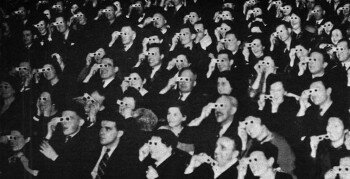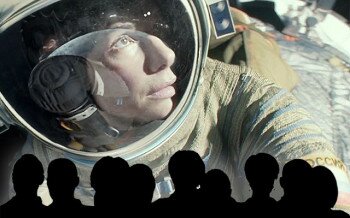 I won’t mince words with you: I hate movie theatres, and I hate myself for it. I don’t know how it happens to me, but I become some cynical old curmudgeon when my film-buff of a husband asks if we can go see the latest flick, and it’s quite a visceral response. But it wasn’t always this way. I remember quite often going with friends to the movies and seeing big blockbusters for the first time on the big screen: Titanic, The Lion King, Avatar, and others.
I won’t mince words with you: I hate movie theatres, and I hate myself for it. I don’t know how it happens to me, but I become some cynical old curmudgeon when my film-buff of a husband asks if we can go see the latest flick, and it’s quite a visceral response. But it wasn’t always this way. I remember quite often going with friends to the movies and seeing big blockbusters for the first time on the big screen: Titanic, The Lion King, Avatar, and others.
And I remember the feeling of excitement, I really do. Seeing things explode, lovers reunite, or a protagonist turn out to be far less of a hero than expected – it was nice, seeing a movie.
Now it’s just constant refusal. Nope. Not going. Even though I’d love to tear into Guardians of the Galaxy and I regret never seeing Boyhood, I’m still not budging.
Why?
I can blame a lot of things, really. The fact that as time moves in its linear fashion, I am forced to become embittered with age and hate the coming generation; the fact that society has obviously declined, somehow right in tandem with my childhood. But in all seriousness, the thing I’m blaming knows no age or amount of perceived politeness: Netflix.
 Netflix has turned a movie theater into a large living room with an even larger cover charge. And it’s a real double-edged sword, because I love Netflix. I love knowing that I can access films (a lot of them Criteron Collection or classics that have been restored) right from my living room. Or, you know, I can binge watch Bob’s Burgers without feeling ashamed. But at the same time, we’ve gone mad with power, and it ties in with the technology we bring along. People sit in theaters and browse on their phones like they’ll be able to press pause and rewind the movie. I’ve seen people check emails, and even take phone calls, during the most pivotal points of films.
Netflix has turned a movie theater into a large living room with an even larger cover charge. And it’s a real double-edged sword, because I love Netflix. I love knowing that I can access films (a lot of them Criteron Collection or classics that have been restored) right from my living room. Or, you know, I can binge watch Bob’s Burgers without feeling ashamed. But at the same time, we’ve gone mad with power, and it ties in with the technology we bring along. People sit in theaters and browse on their phones like they’ll be able to press pause and rewind the movie. I’ve seen people check emails, and even take phone calls, during the most pivotal points of films.
But it doesn’t even come close to the people who talk. There is literally nothing worse than sitting in a film and knowing that you’ve lost the seat lottery because you sat next to someone who can’t keep their mouth shut. And I understand, there are moments of a film that are shocking, scary, funny, and they all usually elicit responses that are vocal – a scream, laugh, etc.
But during the last film I saw, Dawn of the Planet of Apes, there was a guy next to me who could not go five minutes without providing his own commentary on the film, the new age equivalent of “DON’T GO IN THERE, NOPE, DON’T DO IT.”
 And the film before that? Gravity. Someone messed up my IMAX viewing of Gravity, one of the most immersive film experiences in existence, and I was livid. But my anger is a slow, sluggish one, seeping out of my pores like some radioactive sludge that eventually burns an acidic hole in my hope for humanity to get its act together.
And the film before that? Gravity. Someone messed up my IMAX viewing of Gravity, one of the most immersive film experiences in existence, and I was livid. But my anger is a slow, sluggish one, seeping out of my pores like some radioactive sludge that eventually burns an acidic hole in my hope for humanity to get its act together.
And every time I watch people do this stuff in their seats, I’m always reminded of what I’ve been taught by my screenwriting professors in grad school – the brilliant Tim Kirkman and the wonderfully talented late Syd Field. They always reminded me that when you step into a theater, you sign an invisible contract. You say, “Okay, director, producer, and everyone else involved with this project, I’m here to give you my time. I paid you to come here and sit in the dark with strangers and be told a story, so it’d better be a good one.”
But the more I go to a theater, the more I’m convinced that everyone in the audience has forgotten that this applies to them, too. Being in a theater audience is a beautiful thing when you really think about it – people of all different ideologies, world views, and economic status are gathering together in a room and having a real experience together. And a lot of the time, that experience tells us a lot about us as human beings. But the more people interrupt that experience, the more people that break that contract, the more I’m convinced that the only thing I’m being told is that we really, really suck.
So if you’re reading this, remember the invisible contract next time you’re in a theater, remember that you’re people getting together to have a real experience, and if you just can’t control yourself – that’s what Netflix is for.
 It’s no secret
It’s no secret  A further note on the tone makes Guardians of the Galaxy especially fascinating in the Marvel canon (and I say this as someone versed in the films with little knowledge of the comics). The universe of Star-Lord, of Ronan and Xandar, feels much more like Star Wars or the
A further note on the tone makes Guardians of the Galaxy especially fascinating in the Marvel canon (and I say this as someone versed in the films with little knowledge of the comics). The universe of Star-Lord, of Ronan and Xandar, feels much more like Star Wars or the  When I first heard that Marvel was contemplating a
When I first heard that Marvel was contemplating a  Wit, humor, and directorial vision have always been Gunn’s strong-points as a writer and director, and it’s exactly what Marvel needed to launch a title like Guardians.
Wit, humor, and directorial vision have always been Gunn’s strong-points as a writer and director, and it’s exactly what Marvel needed to launch a title like Guardians.